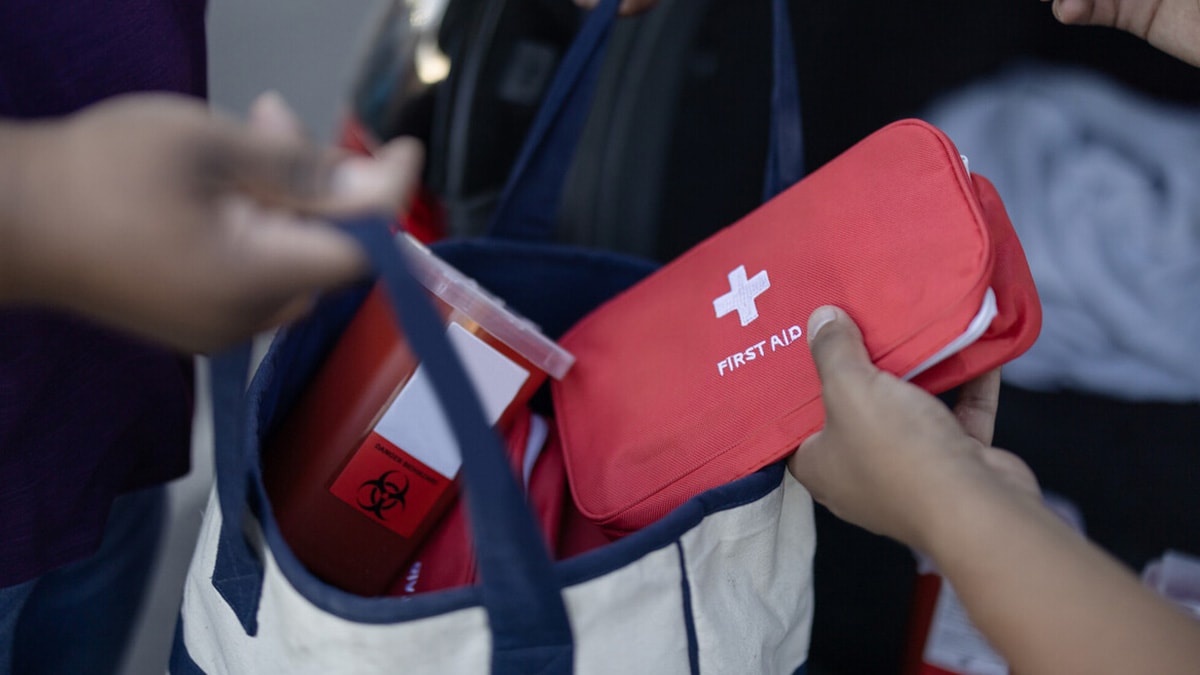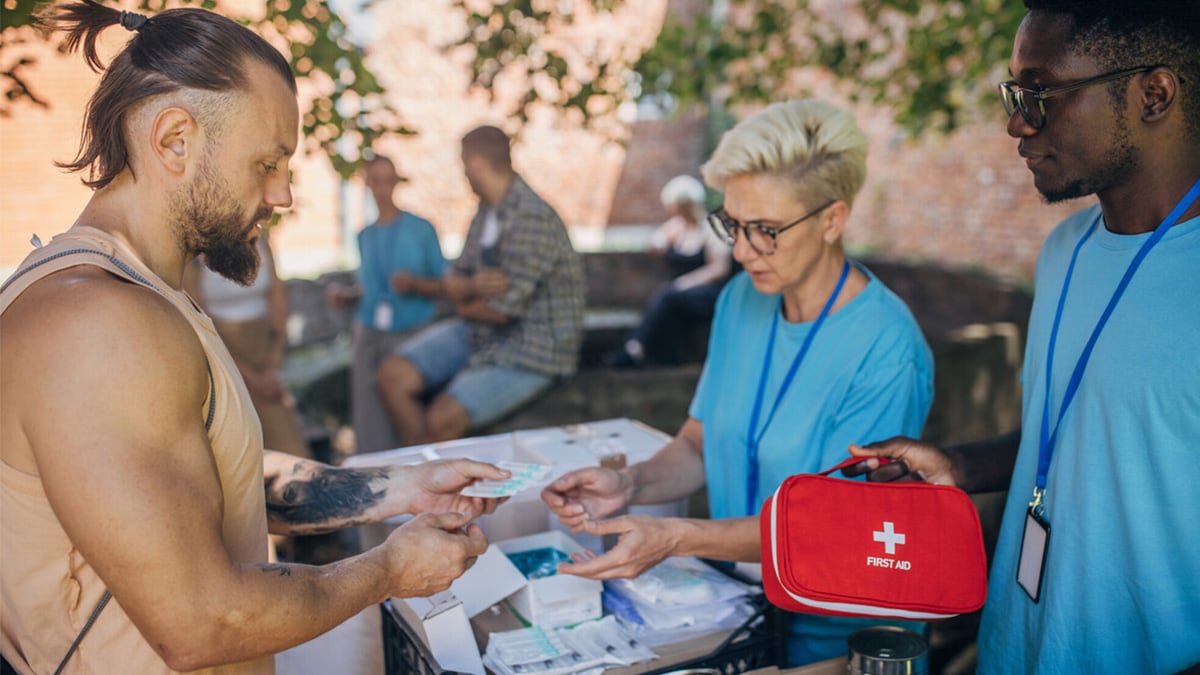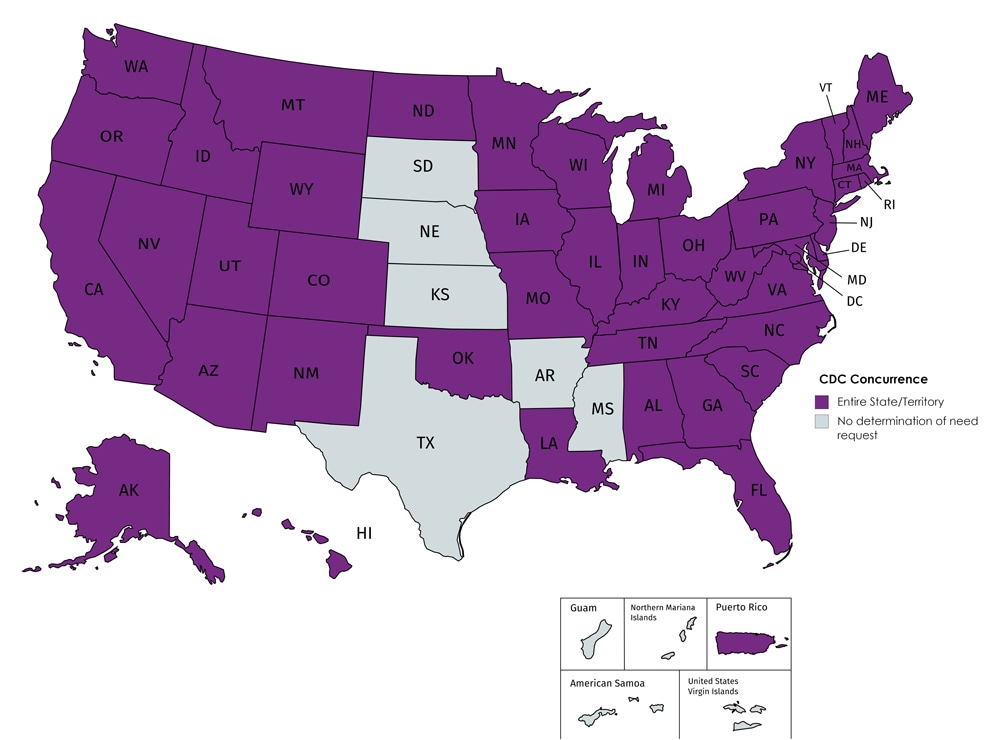Key points
- Federal agencies may support syringe services programs (SSPs) at local levels.
- Evidence from state, local, tribal, or territorial health departments must prove an SSP will be beneficial before funding is allocated.
- Funding may not be used to purchase needles or syringes.

Overview

Appropriation language from Congress in fiscal years 2016-2018 allow the Department of Health and Human Services (HHS) to support syringe services programs (SSPs). It is allowed under certain conditions and is not allowed to be used to purchase needles or syringes.
CDC guidance for SSP funding
State, local, tribal, or territorial health departments must consult with CDC and provide evidence to get SSP funding. They must show that their area is experiencing, or at risk for, significant increases in hepatitis infections or an HIV outbreak due to injection drug use.
CDC has developed guidance and consults with state, local, or tribal and territorial health departments if they have provided the required evidence per federal law.
Decisions about use of SSPs to prevent disease transmission and support the health of people who inject drugs are made at the state and local level.
CDC has 30 business days after receiving the request to notify the requestor whether there is enough evidence to require an SSP. When CDC finds sufficient evidence, local departments and other eligible HHS grant recipients may then apply to their respective federal agencies to direct funds to approved SSP activities.
Federal agency guidance for SSP funding
Each federal agency (e.g., CDC, HRSA, SAMHSA) have their own guidance for funding recipients regarding which specific programs may apply and its application process:
- CDC Program Guidance for Implementing Certain Components of Syringe Services Program, 2016
- HRSA Program Guidance for Implementing Certain Components of Syringe Services Program
- SAMHSA Program Guidance for Implementing Certain Components of Syringe Services Program
The Consolidated Appropriation Act of 2016 allows funds from the Department of Health and Human Services (DHHS) to support SSPs. However, these funds cannot be used to purchase needles or syringes.
To use DHHS funds for SSPs, state, local, tribal, or territorial health departments must consult with CDC. They must provide evidence that their area is experiencing, or at risk for, significant increases in hepatitis infections or an HIV outbreak due to injection drug use.
Who can participate
Jurisdictions Determined to be Experiencing or At-risk of Significant Increases in Hepatitis Infection or an HIV Outbreak Due to Injection Drug Use Following CDC Consultation

| State/Territory (cities and counties, if applicable) |
Date of CDC concurrence | Jurisdictional point of contact | |
|---|---|---|---|
| Alabama statewide | February 1, 2020 | Scott Harris | scott.harris@adph.state.al.us |
| Alaska statewide | January 18, 2017 | Susan A. Jones | susan.jones@alaska.gov |
| Arizona statewide | October 26, 2021 | Christopher Garcia | christopher.d.garcia@azdhs.gov |
| California statewide | August 12, 2016 | Alessandra Ross | Alessandra.Ross@cdph.ca.gov |
| Cherokee Nation (Oklahoma) | November 16, 2018 | Whitney Essex | whitney-essex@cherokee.org |
| Colorado statewide | June 10, 2016 | Andrés Guerrero | andres.guerrero@state.co.us |
| Connecticut statewide | April 5, 2017 | Marianne Buchelli | Marianne.Buchelli@ct.gov |
| District of Columbia | June 27, 2018 | Nestor Rocha | Nestor.Rocha@dc.gov |
| Delaware statewide | January 9, 2019 | Bob Vella | robert.vella@state.de.us |
| Florida statewide | February 1, 2020 | Mara Michniewicz | Mara.Michniewicz@flhealth.gov |
| Georgia statewide | August 31, 2018 | Rodriques Lambert | Rodriques.Lambert@dph.ga.gov |
| Hawaii statewide | February 7, 2018 | Thaddeus Pham | Thaddeus.pham@doh.hawaii.gov |
| Idaho statewide | February 1, 2020 | Randi Pedersen | Randi.Pedersen@dhw.idaho.gov |
| Illinois statewide | October 27, 2017 | Curt Hicks | Curt.Hicks@Illinois.gov |
| Indiana statewide | October 7, 2016 | Dennis Stover | DStover@isdh.IN.gov |
| Iowa statewide | December 4, 2017 | Randy Mayer | Randall.Mayer@idph.iowa.gov |
| Kentucky statewide | September 9, 2016 | Karen Sams | Karen.Sams@ky.gov |
| Louisiana statewide | January 18, 2017 | Sam Burgess | samuel.burgess@la.gov |
| Maine statewide | February 1, 2020 | Jeff Caulfield | jeff.caulfield@maine.gov |
| Maryland statewide | June 17, 2016 | Kip Castner | kip.castner@maryland.gov |
| Massachusetts statewide | June 17, 2016 | Annette Rockwell or Dawn Fukuda | Annette.Rockwell@state.ma.us, dawn.fukuda@massnail.state.ma.us |
| Michigan statewide | June 10, 2016 | Joe Coyle | coylej@michigan.gov |
| Minnesota statewide | August 19, 2016 | Kathy Chinn or Errol Saunders |
kathy.chinn@state.mn.us Errol.Saunders@doh.nj.gov |
| Missouri statewide | September 20, 2019 | Christine Smith | christine.smith@health.mo.gov |
| Montana statewide | May 4, 2018 | Dana Fejes | dfejes@mt.gov |
| Nevada statewide | October 3, 2017 | Lyell Collins | lscollins@health.nv.gov |
| New Hampshire statewide | October 27, 2017 | Lindsay Pierce | Lindsay.Pierce@dhhs.nh.gov |
| New Mexico statewide | August 21, 2018 | Andrew Gans | |
| New Jersey statewide | June 17, 2016 | Steven Saunders | errol.saunders@doh.nj.gov |
| New York statewide | May 26, 2017 | Allan Clear | Allan.Clear@health.ny.gov |
|
July 18, 2018 | Dr. Julie Myers | jmyers@health.nyc.gov |
| North Carolina statewide | February 24, 2017 | Aaron Fleischauer | aaron.fleischauer@dhhs.nc.gov |
| North Dakota statewide | June 16, 2017 | Lindsey VanderBusch | lvanderbusch@nd.gov |
| Ohio statewide | July 24, 2018 | Laurie Ricket | laurie.rickert@odh.ohio.gov |
|
December 2, 2016 | Terry Allan | Tallan@ccbh.net |
|
October 23, 2017 | David Covell | dcovell@loraincountyhealth.com |
| Oklahoma statewide | October 16, 2019 | Kristen Eberly | kristene@health.ok.gov |
| Oregon statewide | October 20, 2017 | Judith Leahy or Joshua Ferrer |
Judith.m.leahy@state.or.us Joshua.s.ferrer@dhsoha.state.or.us |
| Pennsylvania statewide | June 24, 2016 | Charlie Howsare | chowshare@pa.gov |
| Puerto Rico | February 13, 2017 | Javier Vazquez Melendez | javazquez@salud.pr.gov |
| Rhode Island statewide | December 2, 2016 | Katharine Howe | Katharine.howe@health.ri.gov |
| South Carolina statewide | January 9, 2019 | Tony Price | priceae@dhec.sc.gov |
| Tennessee statewide | August 29, 2017 | Allison Wilhem | Allison.Wilhelm@tn.gov |
| Utah statewide | June 17, 2016 | Heather Bush | hbush@utah.gov |
| Vermont statewide | June 17, 2016 | Patsy Kelso | patsy.kelso@vermont.gov |
| Washington statewide | April 26, 2019 | Emalie Huriaux | emalie.huriaux@doh.wa.gov |
| Virginia statewide | March 22, 2017 | Bruce Taylor | Bruce.Taylor@vdh.virginia.gov |
| West Virginia statewide | April 14, 2017 | Will Cohen | William.H.Cohen@wv.gov |
| Wisconsin statewide | September 9, 2016 | Jim Vergeront | james.vergeront@wisconsin.gov |
| Wyoming statewide | September 22, 2017 | Brittany Wardle | brittany.wardle@wyo.gov |
Information current as of March 2, 2022.
